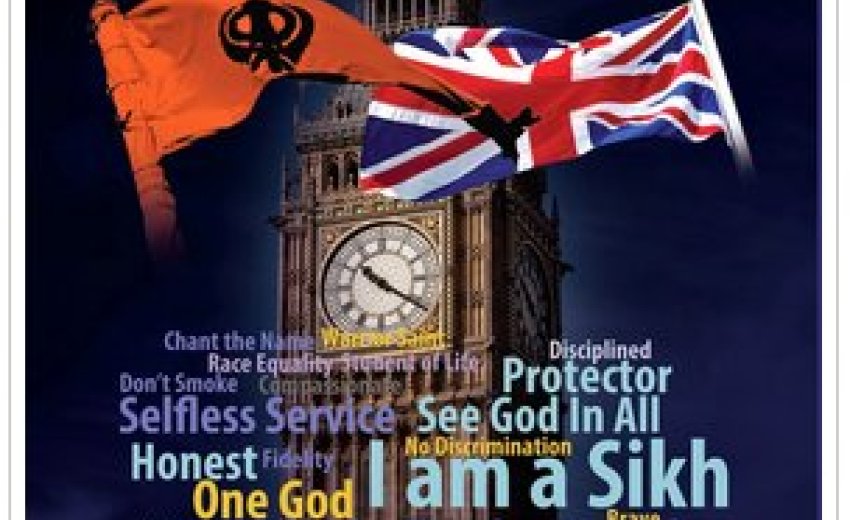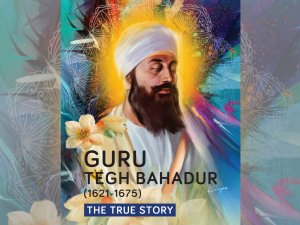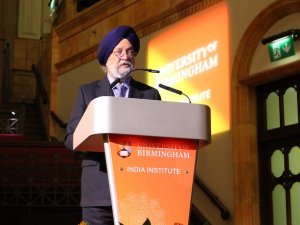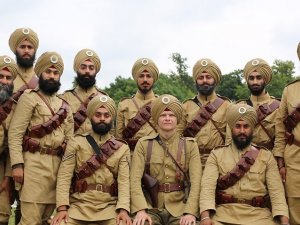| New Sikh Manifesto Promo Video |
|
|
| Published on May 5, 2015 Watch and understand the objective and contents of the Sikh Manifesto 2015-2020 |
| Sikh Manifesto 2015-2020 in Punjabi |
|
|
| Published on May 6, 2015 |
[Read about Gurmukh Singh's own view about the wider impact of UK's Sikh Manifesto below - SikhNet Ed.]
British Sikhs & General Election 2015
http://sewauk.blogspot.com.au/
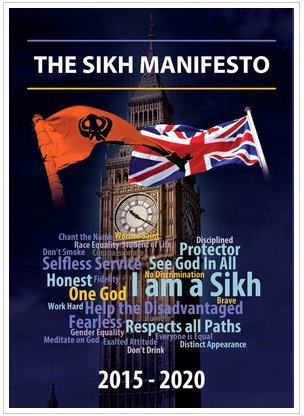 UK General Election was held on 7 May, 2015. Regardless of the direct impact of the Sikh Manifesto on the election results, the main objective of the Sikh Manfesto in raising general awareness of Sikh issues, has been achieved.
UK General Election was held on 7 May, 2015. Regardless of the direct impact of the Sikh Manifesto on the election results, the main objective of the Sikh Manfesto in raising general awareness of Sikh issues, has been achieved.
The process of consultation also generated much interest and publicity within the community.
The glossy publication has been widely distributed in the UK. For the first time in the history of British Sikhs, all Parliamentary candidates are aware of what Sikh issues are. Even the Sikhs themselves are better informed about own medium and longer term concerns and interests as a distinct miri-piri (temporal-spiritual) community in the British plural society.
We can say with confidence that following the events of 2014, including World War 1 commemorations which featured young Sikhs in WW1 uniforms, that the distinct Sikh identity is no longer “mistaken”. Some of these events made mainstream media headlines.
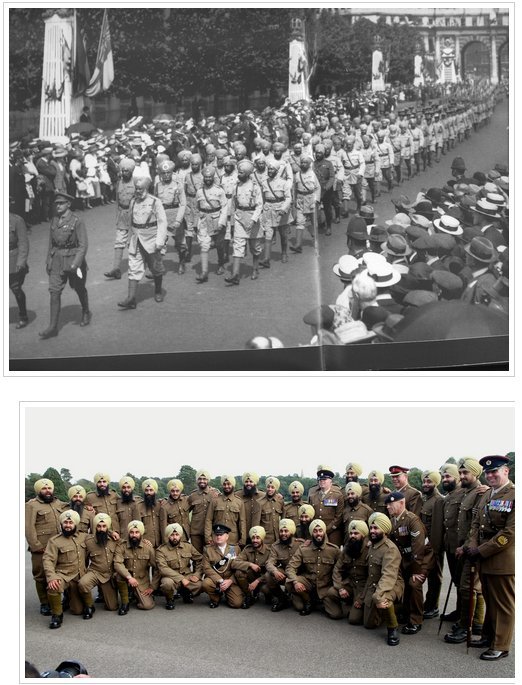 |
| Young Sikhs in WW1 uniforms at Sandhurst, UK |
Parliamentary lobbying, questions and debates have covered Sikh issues and concerns and the main political parties are alert to Sikh voting power.
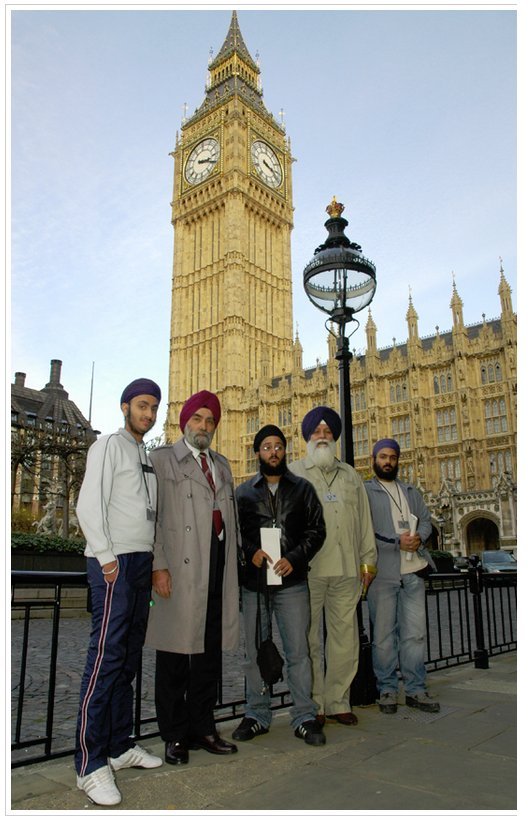 |
| French Sikh students at a Sikh Parliament lobby day organised by Sikh Federation UK. The students addressed MPs in fluent French. |
Daring initiatives by identity Sikhs, like the aid ventures of Ravinder Singh of Khalsa Aid in Iraq, promoting the Sikh institution of “langar” seva, held sustained media interest; as did Khalsa Aid’s earlier response to appeal by Somerset (UK) flood victims.
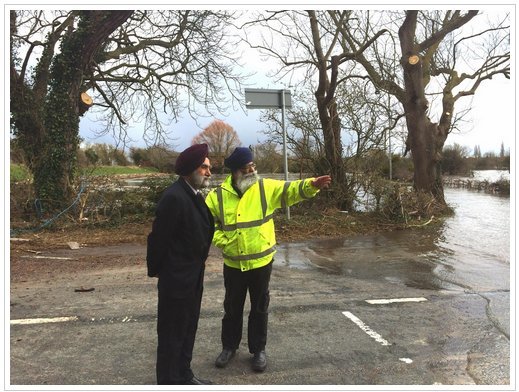 |
| Ravinder Singh of Khalsa Aid with author |
Sikhs are an outstanding example of harmonised living with sister communities. They have shown how diversity – in their case distinct Sikh religio-cultural identity – can be accommodated within national identity. They have retained own core values and way of life while enriching the way of life of the countries they live in.
On 25 April, the 100th anniversary of Australian and New Zealand (ANZAC) troops landing at Gallipoli in World War I, was marked by nationwide commemorative events.
As I write this article from Australia, I am also looking at some images of visible Sikh presence at these events in Australia and New Zealand.
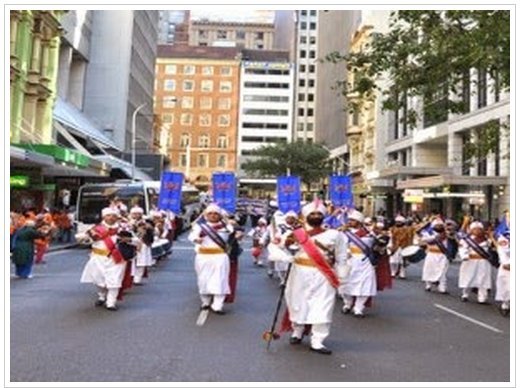 |
| Sikhs marching on ANZAC Day in Sydney, Australia. |
Prominent local Sikhs are alert to such opportunities.
In South Australia, Sardar Baldev Singh Dhaliwal JP, ex-Councillor and leading community mentor for over three decades, attended local commemorations at Adelaide, to show Sikh solidarity with fellow Australians.
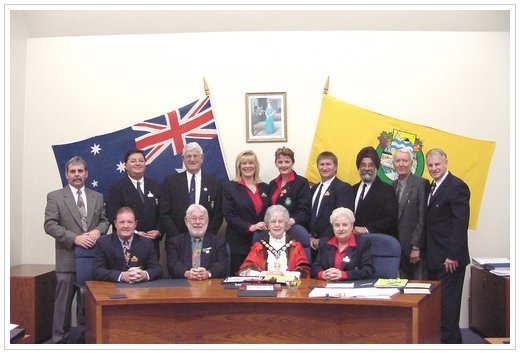 |
| Baldev Singh Dhaliwal JP when he became the first Sikh Councillor in Riverland, South Australia. |
A Sikh Australian journalist wrote, “As Australians prepare to mark this centenary with great respect, to honour those who fell in the battle, the contribution of Indian troops in Gallipoli is also being remembered. They comprised Gurkha and Sikh battalions, and thousands of mule drivers who literally moved the British forces and their allies; but their vital contributions to the Gallipoli campaign has been overlooked..…. Many regard April 25, 1915, as the day when Australia truly forged its national identity.” (Manpreet K. Singh of Melbourne).
Like the Australians a hundred years ago, young Sikhs in the diaspora are also re-discovering their proud military tradition and national identity.
The role of the Sikhs in World War I is brought out together with that of other communities from undivided India. Despite the confusing label “Indian” used in World War 1 commemorations for Hindus, Muslims (many now in Pakistan and Bangladesh) and Sikhs in the undivided Indian subcontinent, the role of the Sikhs in World War I as a distinct people, is now increasingly acknowledged. In UK, a lion's share of the credit goes to dedicated Sikhs led by S. Harbinder Singh Rana of Anglo-Sikh Heritage Trail.
Due to electronic media and extended family communications, Sikhs in diaspora countries are well informed about Sikh participation in the life of the nation in the UK. One article in “Daily Sikh Updates” of 17 March, lists ten progressive points about UK Sikhs from which Sikhs in other countries can learn. The Sikh Manifesto is listed as a major achievement in that article. The Manifesto also shows the way to successful Sikh integration in the plural western societies.
It seems that, at last, diaspora Sikhs are beginning to take up the “mistaken identity” challenge to unique Sikh identity more seriously. The message loud and clear is that “We are Sikhs and we have hard won rights as loyal citizens of the countries we live in”. The message is reaching the politicians, mainstream media and the public.
Yet, Sikh miri-piri (temporal-spiritual) ideology ensures that their loyalty is not unconditional. The egalitarian Sikh ideology will support equality and justice for all; but, it will oppose all types of discrimination, injustice and authoritarian regimes. Sikhs have integrated and adopted British identity as loyal citizens, as the second part of their “Sikh-British” identity. However, Sikhs have always opposed “assimilation” i.e. absorption into the majority community, at the expense of diversity. British society has evolved so that no one talks about “assimilation” anymore.
Most civilised countries have evolved to include diversity as an integral part of their way of life. Today, the “English way of life” includes diversity. That is how the civilised world is coping with the phenomenon of a shrinking global village in which diversity has to co-exist with universal human values. That is a challenge for those religious communities who are struggling to reconcile their religious codes and practices with internationally accepted human rights.
British Sikhs should focus on the Sikh Manifesto issues to secure a fairer deal in British pluralism. They need no advice or support from abroad. They should not become embroiled in issues such as caste politics in the UK. [It strains credulity to the limit when some try to convince us that caste is a British colonial invention!]
There are some issues like the plight of illegal immigrants from India, including Panjab, which require humanitarian solutions. Such matters should be discussed and tackled in consultation with the government. However, to take up such issues in the context of a general election would be counterproductive in the current political climate.
The impression from Sikh diaspora countries is that, at last, British Sikhs are getting their political act together. While the Sikh Manifesto promotes united action by UK Sikhs under ten points, it also encourages global Sikh communities to play a more prominent public role in their adopted countries. It helps integration, while promoting Sikhs as a distinct global theo-political community.
Sikh Manifesto link:
https://www.dropbox.com/s/4tpu52zulblmulp/The%20Sikh%20Manifesto%202015-20%20by%20The%20Sikh%20Network.pdf?dl=0
Gurmukh Singh
[email protected]
